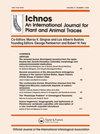技术数据库的结构和重要性
IF 2
4区 地球科学
Q4 PALEONTOLOGY
Ichnos-An International Journal for Plant and Animal Traces
Pub Date : 2020-07-15
DOI:10.1080/10420940.2020.1784157
引用次数: 0
摘要
摘要提出了一个技术数据关系数据库的设计,以说明和解决当前古生物数据库的不足。目前,古生物学数据库应用来源于人体化石研究的概念和术语来追踪化石记录。我们认为,身体化石和痕迹化石之间的根本差异使这种做法不合适。这些差异源于这样一个事实,即痕迹化石代表了痕迹制造者的行为,而不是生物体的系统发育亲缘关系。这个被称为IchnoDB的数据库在整个设计过程中都经过了作者的测试,以确保对当前古生物学数据库所做的修改是有效的。在描述支撑技术数据库的设计和逻辑时,我们希望看到已建立的古生物数据库将技术特定领域纳入其结构中。这将支持和鼓励未来的研究,包括使用大型技术数据集。本文章由计算机程序翻译,如有差异,请以英文原文为准。
IchnoDB: structure and importance of an ichnology database
Abstract The design of a relational database for ichnological data is presented to illustrate and address deficiencies in present-day palaeontological databases. Currently, palaeontology databases apply concepts and terminology derived from the study of body fossils to trace fossil records. We suggest that fundamental differences between body and trace fossils make this practice inappropriate. These differences stem from the fact that trace fossils represent the behaviour of the tracemaker, and not the phylogenetic affinities of an organism. This database, referred to as IchnoDB, has been tested by the authors throughout the design process to ensure that recommended alterations to current palaeontology databases made herein are functional. In describing the design and logic that underpins an ichnology database, it is our desire to see established palaeontological databases incorporate ichnology specific fields into their structure. This would support and encourage future research, involving the use of large ichnological datasets.
求助全文
通过发布文献求助,成功后即可免费获取论文全文。
去求助
来源期刊
CiteScore
2.50
自引率
12.50%
发文量
0
审稿时长
>12 weeks
期刊介绍:
The foremost aim of Ichnos is to promote excellence in ichnologic research. Primary emphases center upon the ethologic and ecologic significance of tracemaking organisms; organism-substrate interrelationships; and the role of biogenic processes in environmental reconstruction, sediment dynamics, sequence or event stratigraphy, biogeochemistry, and sedimentary diagenesis. Each contribution rests upon a firm taxonomic foundation, although papers dealing solely with systematics and nomenclature may have less priority than those dealing with conceptual and interpretive aspects of ichnology. Contributions from biologists and geologists are equally welcome.
The format for Ichnos is designed to accommodate several types of manuscripts, including Research Articles (comprehensive articles dealing with original, fundamental research in ichnology), and Short Communications (short, succinct papers treating certain aspects of the history of ichnology, book reviews, news and notes, or invited comments dealing with current or contentious issues). The large page size and two-column format lend flexibility to the design of tables and illustrations. Thorough but timely reviews and rapid publication of manuscripts are integral parts of the process.

 求助内容:
求助内容: 应助结果提醒方式:
应助结果提醒方式:


